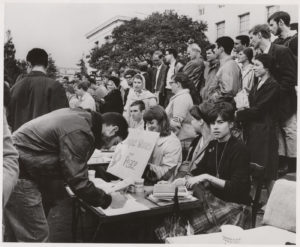From the Director — March 2020
From all of us at the Oral History Center, we are wishing you our best in these challenging times. We hope that you’re doing your best to get through the coming days, and above all, you and your loved ones are staying safe and healthy.
In a recent oral history, George Miller discussed the idea of the dreaded “Black Swan” event that might strike at a moment’s notice, leaving destruction and disruption in its wake. But Miller has artfully crafted a healthy sense of informed detachment and thus always used these events as an opportunity for learning and reflection. Perhaps the greatest lesson from the Black Swan events he experienced in the world of finance was that we always came out the other side — maybe a bit bruised but ready to face another day. So, as many of us sit at home, self-isolating, I invite you to take a break from the constant news feed of what is happening right now and instead spend some time in the past. Delve into the OHC archive of transcripts and recordings and expose yourself, for example, to many individuals who achieved great things in their lives but who each experienced Black Swan events of their own. Trial and turbulence, patience and perseverance.

Perhaps not surprisingly, many of the most remarkable of these stories come from women we’ve interviewed, in particular those women who broke glass ceilings in the workplace and the realm of politics. We’re currently developing a database documenting the hundreds of women we’ve interviewed over the years who were connected to the University of California — as part of the 150 Years of Women at Berkeley celebration. And we continue to contribute to this history with plenty of recent interviews, including female students who were active in the SLATE organization on campus in the 1950s and 60s. And then many more interviews with women who persevered while working in support of the arts (Kathleen Dardes), the environment (Michelle Perrault), and public service (Anne Halsted). You’ll see a handful of those stories referenced in this newsletter but I encourage you to just jump in, browse the collection (our Projects page is the best way to do this), and allow the thousands of life stories we’ve collected give you reassurance, perspective, and company.
Finally, we’ve made the decision to postpone our annual Oral History Commencement in which we invite our interviewees to campus for a lively celebration of oral histories completed in the past year. We still want to express our gratitude to our narrators, so stayed tuned.
Martin Meeker, Charles B. Faulhaber Director of the Oral History Center